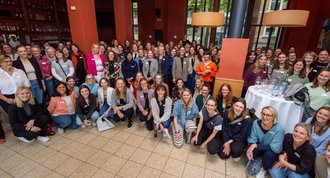
For Travel and Tourism software architect Peter Gruber and his wife, one thing was always clear: they both wanted to share raising the children - as much as possible. This also means cutting back on work. We wanted to find out how this works.
one: Mr Gruber, you have been working 80 per cent for three years so that you can look after your 6-year-old daughter more. Are part-time fathers like you still aliens?
Peter Gruber: No, certainly not. Or rather: fortunately not. However, when I take part in events or parent meetings at the kindergarten in the afternoon, there is still no parity. The men are still clearly outnumbered.
one: How do you explain that?
Peter Gruber: I can only speak for myself and from my experience in my environment. First of all, of course, you have to want it. For my wife and I, it was always clear that when our daughter went to nursery school at the latest, we would share the child-rearing 'around it'. I really wanted that - to take the pressure off my wife, but also for my own happiness: being able to actively participate in the children's lives at an early age is a great gift.
one: But the desire alone is not enough. Part-time work must also be feasible.
Peter Gruber: Of course. It's certainly not easy in every job. However, I believe that in many office or knowledge-based jobs - for example in call centres, support, etc. - it should actually be feasible. It's often mainly a question of organisation and willpower. A certain problem is that when it comes to raising children, you are usually not available in the afternoon. But there are also colleagues who work part-time for other reasons - and perhaps even prefer to work in the afternoons.
one: What was it like for you - was it easy to realise your wish to work part-time?
Peter Gruber: Yes, for me it went very smoothly and without any problems. This is certainly also due to the fact that part-time work is not uncommon in IT and is usually easy to organise. I even know some people who now have several children and have even reduced their working hours to 60 per cent. In IT, there is often not much resistance. The work is mostly remote and very easy to structure. Two-week sprints are standard. It doesn't necessarily depend on one day, as long as the sprints are reliably adhered to. It's certainly different in other areas. Nevertheless, I believe that a lot can now be organised very well - of course also thanks to modern technology, calendars, etc.
one: How did you organise your team?
Peter Gruber: It works very well. As there are only two of us in the software architecture team, we can coordinate very well and, for example, organise our joint team meetings in the morning. Otherwise we split up. In the best case scenario, only one of us is in meetings at any one time, and then we coordinate with each other afterwards. We also have a high division of labour anyway and, as there are only two of us, we are often available relatively dynamically.
one: In such a small team, how do you ensure that you still have your "peace and quiet" on your two free afternoons?
Peter Gruber: The simple way is to block appointments in my diary so that nobody books me. Sometimes, in very important cases, I may be there remotely when I'm travelling. But that's part of our job anyway.
one: Is the reduction in working hours a temporary model for you - or do you want to stick with it permanently?
Peter Gruber: I would definitely like to stay at 80 per cent permanently.
one: Does that mean you're happy as a short-term dad?
Peter Gruber: Yes, definitely. Children and parents get so much out of it. You're much more involved in social activities, you can also go along to events, all the sports activities, for example. As a father, you also get to know the other parents a bit. You don't just hand over the child and quickly leave again.
I can only recommend this to anyone! I think it helps a lot to have the afternoon free and help out. It's very valuable for the whole family.












